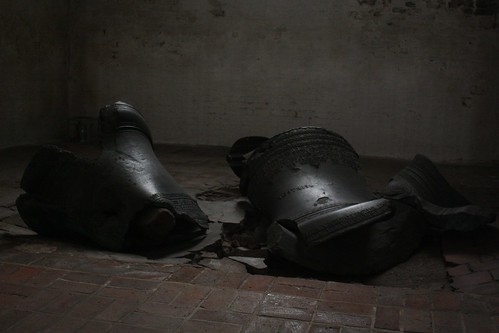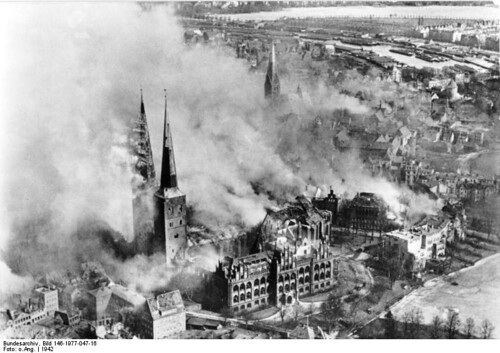Seeing these church bells in Lübeck wasn’t easy for me. They melted and fell to the ground after an air raid in 1942, and have been left exactly as they fell.
I wasn’t alive in 1942, and even my parents hadn’t yet been born. My grandfather was relocated by the American government because he refused to fight in the military for religious reasons.
And yet, I still felt a sense of embarrassment, being an American standing there in Germany next to those bells. My country* did things like this. Why? Even if there’s a war on, and whatever the other side may be doing, do we really have to bomb all their churches?
Then, we went to the Dom (cathedral). It has a small gallery of photos of the destruction in 1942, and how it took 40 years to restore (though some original works are simply irreplaceable.)
I had just been walking through the beautiful Dom, and then saw pictures like that. It was very sad. I imagined the people in 1942, seeing the smoking remains of so many buildings that had been important to the town for centuries. Places where, no doubt, some of them worshiped, and their parents and grandparents had too. I imagined my sadness if a country bombed one of the churches that my ancestors helped start or build. I felt ashamed of what the democracy in which I live (and its allies) did to the Dom, to Marienkirche, and to the other churches and civilians there.
Then, a few days ago, Wikileaks posted a video from an American helicopter in which our soldiers begged “Come on, let us shoot!” at people, most or all of which were completely unarmed. They killed a bunch of people. Then a van came to try to get the wounded to the hospital. Then the soldiers in helicopter killed those people, and wounded some children. Even if they thought their lives were in danger, I’d expect to hear some quiet sadness at what they thought was a regrettable need to use force. Instead, you’d hear them cheering whenever they killed someone, as if they had just won a round on some video game. They killed civilians, and considered it a fun experience and a mission accomplished. There was no sadness for knocking a man to the ground, leaving him writhing. Just jokes. There was no more care for human life here than there was 60 years ago.
It saddens me that every year we celebrate our military on independence day — celebrating its ability to kill, not its ability to feed. I wish that we could rather celebrate the times Americans have saved lives, whether in Berlin or in Port-au-Prince, or helped to topple dictatorships. Military power shouldn’t be our first choice so often.
Lübeck wasn’t attacked for any strategic purpose; the British did it to destroy the “morale of the enemy civil population”, as the Americans did in Dresden or the Germans in London. In other words, those bells fell to the ground for no reason other than that they were German. People lost their lives for the same reason — in Germany and in London. The British had no reason to believe that those civilians meant them any harm, that they were anything but caught between two strong powers. And the same held true in Iraq.
When we went to Berlin, we walked through the replica of Checkpoint Charlie, with the big sign announcing that “you are leaving the American sector.” There is little positive to be said about the Cold War, but there is something the British and American military did of which I am not the least ashamed: the Berlin Airlift. Although I didn’t see it, I feel a sense of the USA having been a force for good when I read about the Berlin Airlift Monument at Tempelhof, which has the names of the 70 British and American men that lost their lives in the airlift (due to accidents), above the inscription “They gave their lives for the freedom of Berlin.” That’s the spirit I wish we’d see more often in the world today: people giving their lives not just for their own security, but for strangers in need on a different continent.
We Americans have been, compared to many countries in Europe, relatively sheltered from the ravages of war in our own midst. I wish that more of us would have the opportunity to gaze at fallen church bells, to wonder through a magnificent old church and then to see photos of it on fire, or to see a monument to our soldiers in a far away land. Perhaps then we could better learn from history, and see firsthand that some of our most positive contributions to the world have come in the form of coal and candy bars instead of incendiary devices.
A small post script
Many historic buildings or locations we saw in Germany had plaques on their exterior with a brief history, often in German and in English. I was interested to note that some (though not all) of these plaques had language such as “destroyed by fire in 1942”, with no mention that the cause of the fire was a bombing. I was even more interested to note that same sort of description at several sites in Prague Castle, mentioning that the original building was lost in the fire of 1142. It was only on the third or fourth building in the Castle that we learned that the fire of 1142 was caused by a military siege of Prague Castle.
* I know it was the British at Lübeck, but the Americans did similar things elsewhere.
I also acknowledge that, at a macro level at least, the Berlin Airlift wasn’t purely an altruistic act, as there were geopolitical factors in play. But I am speaking of the actions of the airmen here, who took on considerable risk to help others.

